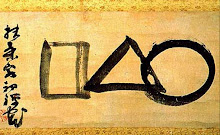 Published in Berkeley Daily Planet, July 3, 2007.
Published in Berkeley Daily Planet, July 3, 2007.Today, the biggest "temples" are skyscrapers devoted to office work; no cathedrals at the center of town devoted to worship of a Higher Power. The true religion of world civilization is money. The attack upon of the World Trade Center in New York City was not just an "attack upon America" but an attack upon the current modes of world civilization. Terrorism challenges civilization, just like street crime challenges a local community. Crime is a symptom of a social sickness; terrorism is the surface symptom of systemic disorder in civilization.
What's wrong with civilization now? We must ask and dig into this question. This question has been asked since the beginning of the industrial revolution. And, needs to be asked even more now. The terrorism that we suffer now is happening as a tension between the oil producing and oil consuming parts of our civilized modern world. I have no answers, but ask that we just look at this tension in all its dimensions.
Modern global civilization depends on freeways, cheap petroleum, making lots of stuff, shipping stuff here and there, extensive personal and business travel, telecommunications and computer networks. These are the wonders, and potential downfalls, of our age.
Our money-oil based global civilization undermines the Earth itself. Without Life on earth, the notion of "economy" is meaningless. Our governments, businesses, and households assume "growth" as the prime measure of a healthy economy. Earth has finite resources. Humans are now hitting Earth's walls. It's time to renew our models of economic health to include the health of all life on the planet -- not just humans. Economic grow alone is very dangerous at this time.
Commuting in private cars to work is not an acceptable form of civilization. Freeways are the backbone of modern urban civilization. They encourage sprawl - commuting from one city to another. Freeways, in the morning are clogged with cars in both directions -- going to work where you do not live sometimes one or two hours away. Pedestrian communities need to become the norm. Work, live and play within walking distance of your bedroom.
The consumer economy with its advertising and marketing system, encourages spiritual bankruptcy to increase the making, selling and buying of "goods" to create satisfaction that never stays. So we must go on to consuming more.
Security will come from little actions. Little actions change the world. Save a bit of a tree by NOT using the wood coffee stir stick to mix the half-and-half in. You know that the cream will swirl around by itself. Drive a little less, walk more. You'll be healthier and have cleaner air. Don't just air travel on a whim, even if you can afford it. Stay near home; become a tourist in your neighborhood. Find work near home. Life will become more relaxed. Share cars. Go for "growth in value", not growth in consumption. A new kind of consumerism is needed: a consumerism of knowledge and wisdom rather than things. Place more value on time with friends and family rather than exchanging gifts. Remember that you buy your money with the time in your life -- time that you could have used for real relationship with friends and family instead of buying things and experiences.
This post-consumer world will not be so wealthy in material, but will be much wealthier in spirit -- we'll have more time for being and creativity. This could become the basis of a real security, of a world that does not breed terrorism. A world where the tension between oil production and oil consumption is not the fuel of politics, religious wars and hate campaigns.
Civilization as we know it now will either collapse or transform. I vote for transformation; for the gradual changing of our ways of life until we get to a life positive form of civilization. This post-consumer world will also be a world without terror as we know it now. It will be a kinder place.
